Mary Lowson

Mary Lowson was born in Australia in 1895. She worked as a teacher before deciding to join the nursing profession. Mary was also an active member of the Communist Party of Australia.
She became a nurse and eventually found work at Lidcombe State Hospital and Home for Men in Sydney. Also working at the hospital were May Macfarlane and Una Wilson. As Judith Keene pointed out in her book, The Last Mile to Huesca: An Australian Nurse in the Spanish Civil War (1988): "It was a depressing place, little more than "a dumping ground for destitute old men, and the three had chafted at the poor conditions and the barely adequate pay."
In 1936 Lowson helped to establish the Sydney Spanish Relief Committee. In August 1936 the Australian Spanish Relief Committee decided to send a medical aid unit caring for Republican wounded during the Spanish Civil War. This included sending four nurses from Australia. Lowson applied and was accepted and in October 1936 she travelled from Sydney to Barcelona on the Oransay with Agnes Hodgson, May Macfarlane and Una Wilson. Wilson told reporters shortly before sailing: "If we get captured or shot that's that. It's only a few years off your life and its better than spending all your days in a private hospital. Danger is the spice of life, that and the feeling that we'll be doing something with real meaning."
Agnes Hodgson, unlike the other three nurses, who were all members of the Communist Party of Australia, she was not a left-wing political activist. Mary Lowson was especially critical of Hodgson's liberal views. Judith Keene has argued: "Although Agnes had little time for Mussolini and fascism, she had been seduced by Italian culture, the warmth of Italian people, and the joys of an Italian lifestyle while living in Italy. Mary, on the other hand, was a dedicated communist committed to the long haul to the proletarian revolution."
The Oransay arrived at Toulon at the end of November. They were met by the Toulon Movement Against the War. A public meeting was held by supporters of the Popular Front government in Spain and as the four women were announced and walked towards the stage the crowded hall sang the Internationale.

and Aileen Palmer in Barcelona in December 1936.
The women arrived in Barcelona on 1st December 1936. Mary Lowson immediately informed Kenneth Sinclair Loutit and Hugh O'Donnell, administrators for British Medical Aid, that Agnes Hodgson was a fascist who she considered was spying on behalf of the Nationalists. She was immediately called in for questioning by the Partit Socialista Unificat de Catalunya (PSUC). May Macfarlane and Una Wilson complained to Lowson about how their colleague was being treated. They claimed they would return to Australia if anything happened to Hodgson. Writing later to the Australian Spanish Relief Committee about Lowson's behaviour, she admitted that she feared "they would be bumped off."
Eventually, Mary Lowson, May Macfarlane and Una Wilson travelled to the International Brigade hospital near Albacete, whereas Agnes Hodgson was left behind in Barcelona. Lowson, after a few weeks working at the hospital returned to the city where she was attached to the English Section of the Republican Information Service which produced propaganda for the Popular Front government in Spain.
Lowson made several trips to France to purchase food and supplies for Spain. In April 1937 she single-handedly took a truckload of goods to Madrid. She admitted later: "This is the first time I have had the opportunity to do this sort of work... which is the most interesting work I have ever done in my life."
In September 1937 she returned to Australia for a speaking tour that raised money for the Spanish Republic. The Australian Relief Committee had heard about her campaign against Agnes Hodgson and insisted that if she returned to Spain she must nurse the wounded. She agreed to do this and worked in hospitals until the International Brigades were withdrawn at the end of 1938. After the fall of Barcelona she looked after Spanish refugees in camps in France.
Primary Sources
(1) Judith Keene, The Last Mile to Huesca: An Australian Nurse in the Spanish Civil War (1988)
Mary Lowson led the unit. At 41 years of age she was the oldest of the group and had been a trained teacher before taking up nursing. Small in stature, Mary was blessed with immense energy and determination. She was one of the foundation members of the Sydney Spanish Relief Committee and had been active in the Communist Party for several years....
Aboard the Oronsay on the trip to Europe the four women did as had many young Australians before them. They made half-hearted attempts to study Spanish from the language books they had brought, and wholeheartedly threw themselves into the festivities of ship board life, dressing for dinner, and playing deck games. At ports of call the nurses toured the sights, shopped for souvenirs, and took snapshots of each other to send home.
Agnes's spirits grew higher as Europe drew closer. The pleasures of the trip were only marred by a growing antagonism between Agnes and Mary Lowson. Agnes was very gay, and enjoyed the sociability of the ship. She was also an old hand at travel, spoke Italian, and could reminisce and make comparisons with her previous trips. All in all she may have struck Mary Lowson as a frivolous companion with whom to be heading off to war. Agnes's politics - liberal, anti-fascist and chary of communism - undoubtedly also irked Mary. Although Agues had little time for Mussolini and fascism, she had been seduced by Italian culture, the warmth of Italian people, and the joys of an Italian lifestyle while living in Italy. Mary, on the other hand, was a dedicated communist committed to the long haul to the proletarian revolution. From her
involvement in the Australian anti-fascist movement during the Italian invasion of Abyssinia, Mary knew that Italy was a fascist state with a bully-boy leader. In her eyes it was probably inconceivable that anyone could extol the virtues of Italian opera and the wonders of Italian food when these were no more than the superficial facade of a fascist regime. A final irritant was that Agnes insisted on attending shipboard church services and frequently took Una Wilson along with her.
These personal differences blossomed into a confrontation in Naples where Agnes intended to spend the day visiting an Italian friend. Mary was fearful that four Australian nurses on their way to Republican Spain would attract hostile Italian demonstrations, and even perhaps, that Agnes's friend might be an Italian fascist. Agnes considered it highly unlikely that Mussolini would have heard about four Australian nurses, or would have been bothered about them. In any event, Agnes's friend did not materialize and there were no demonstrations in Naples, but the incident rankled. With no experience of the Left in the early 1930s, Agnes found Mary's obsession with Italian fascism premature and inappropriate and the latter probably found Agnes politically naive and frivolous.
(2) Agnes Hodgson, diary entry (17th November, 1936)
Arrived at Aden. All went ashore and walked round the town - Macfarlane and self photographing the rest in turn. Lowson changed Indian money donated at Colombo. We were pestered by amusing small imps for baksheesh, while walking round the shops. An army officer drove us to the post office in his car, then we walked back to the Crescent Hotel to drink beer. Aden attracts me always with its grim rocks clear cut against the sky. It's a brave place and the inhabitants please me more than the Cingalese of Colombo. They laugh more.
Left Aden - fancy dress ball at night. All four dressed up: Lowson as Chinese Flower girl, Wilson as Shakespeare's Miranda, Macfarlane as Peter Pan and myself as the Gay Caballero - more colourful than accurate. Wilson was very much admired and we all enjoyed the dance and appreciated the company's effort to entertain us.
(3) Agnes Hodgson, diary entry (27th November, 1936)
Arrived at Toulon - weather cold and grey - rained later. four men came aboard and inquired for us. They were the Acting Deputy and Secretary of the Communist Party and two others members of other Popular Front organizations. None of them spoke English but we trustingly went ashore with them, rather disconcerted that no one was really certain of our arrival. One of them spoke Italian and asked me to explain to the others who he was. He then demanded to know our plans. Our luggage was deposited in various parts of the Douane. We all ran hither and thither and nobody would listen to me. Lowson searched for someone speaking English. The Orient agent obliged but for a long time it didn't get us any further. Our bags were passed and then it all had to be explained again - which contained equipment - they had to go in bond to Marseille. Our anxious enquiries about Egon Kisch elicited no information - unknown to these people. Finally the luggage departed for the station, and we were taken by taxi to a communist restaurant.
We drank coffee, rather the others did, I drank a vermouth - feeling the need of some stimulant amid such utter confusion and babble of tongues. There we told our story as best we could, Lowson and Macfarlane were welcomed as Communists. I agreed to a statement written by M saying that I was not a communist, having as yet no precise politics, that I am against war, and sympathize with the Spanish government in their struggle. From there we were taken to the Communist headquarters on rue Jean Jaures and met several of their comrades who were all very nice. We were photographed leaving the restaurant. They telephoned then to Marseille to an M. Cristofol to find out what we should do and when we should leave for Marseille. It was decided we should stay the night at Toulon and then go to Marseille in the morning.
We were then taken for an aperitif by the Anti-War and Fascism Secretary, and back to the restaurant to lunch. We ate a very excellent lunch. We took rooms at the Mirabeau Hotel (Grand) and went to meet the Secretary of the Movement Against War and Fascism at home in his cafe. There we met other enthusiasts and the women's representative of Contre la Guerre et Fascisme. She asked us would we convey a packet of woollies to Spain for her. Again we went walking in the rain, this time round the front by the sea to Worms & Co. Orient Agent. We left our political friends below while we were received by the agent, who wanted to know where we were going.

